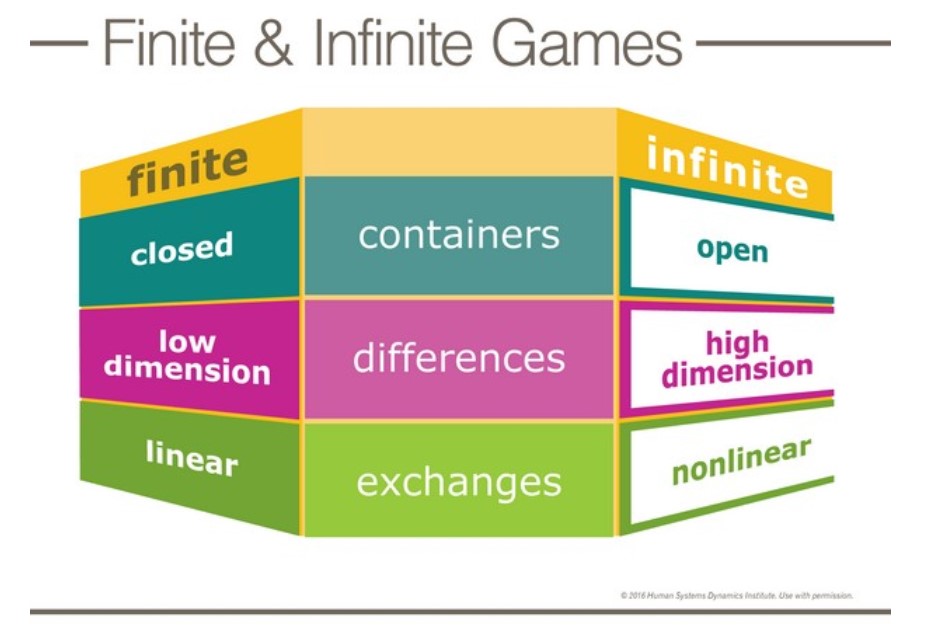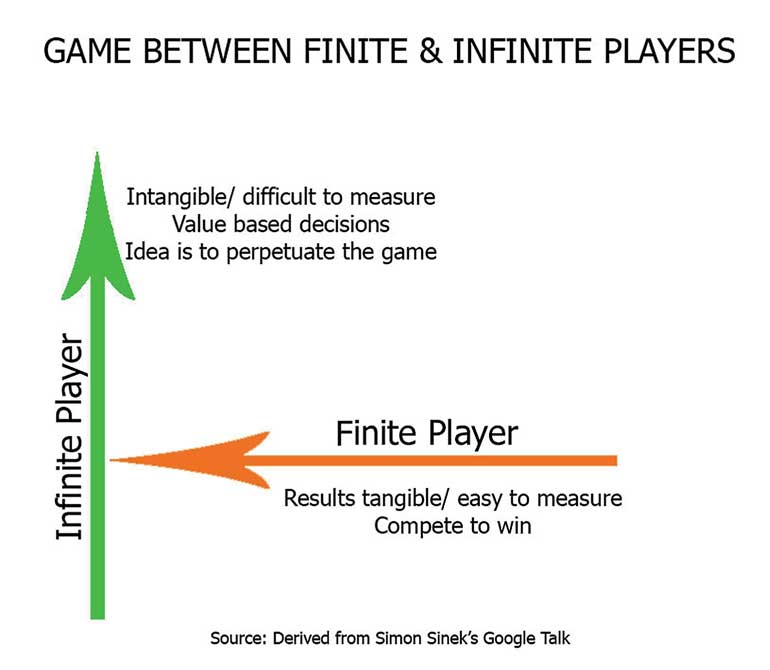Finite And Infinite Games
Dazed, Confused & Ultimately Transcendent
This is not an instruction manual, it is a wake up call!

Finite And Infinite Games - Setting The Scene
Over this past week I have read Professor James Carse's highly regarded "Finite And Infinite Games - A Vision Of Life As Play And Possibility" from cover to cover several times.
Carse uses game theory as an analogy for two alternative views of how to play the game of life.
This is a strange and challenging book. It has no introduction and offers no context or scene setting.
The professor steps up into his pulpit, adjusts his glasses and gazes down at his assembled readership, and with no preamble or pause for dramatic effect, launches straight into it as he opens with the following lines:
Finite And Infinites Games Are Very Different
By employing the analogy of game theory Carse offers a view of life as seen through the lens of these two very different games.
The usual take on all this, as seen from an extensive perusal of online articles and reviews of the book, is that Carse is talking about mindsets and is covering similar territory to Carol Dwek's Growth Mindset.
However, Carse was writing 20 years before Dwek and was a professor of the history and literature of religion whereas Dwek is a psychologist.
My personal view is that, when seen in the context of his full body of published work, Carse's use of the analogy of game theory as a view of life is largely a metaphor that he uses to serve a distinctly transcendent purpose.
But more of that later, for now lets dive into some of the key specifics of each of these two very different perspectives on how to play the game of life.
Finite Games
Finite games have rules, timeframes, boundaries and are predictable, like chess, baseball, basketball or bridge and are played to win.
Passing exams and gaining qualifications and accreditations are also examples of finite games.
Any activity, in any area of life, that has a beginning and an end, and where there is an identifiable winner or loser, is a finite game.
Infinite Games
Infinite games are open and less defined. Marriage, productivity, health, personal growth and development, preparedness to cope with continual change [living antifragile] are all examples of infinite games.
They have no fixed rules, timeframes, or boundaries and are unpredictable
The purpose of an infinite game is to keep on playing.
Contrasting Games
Carse says that there is only one similarity between the two games and that is that the players of each game must only play because they freely choose to play.
Other than the freedom to play, infinite and finite play stand in the sharpest possible contrast...
Having set out his stall for finite and infinite games in the opening lines of his book Carse then devotes the remaining 139 pages to looking at the qualities of each game in a wide range of scenarios and arenas. These include sex, zen, politics, nature, evil, drama, and given his area of expertise, philosophy and metaphysics. To give you a flavour of the scope and insights offered, here is a very small selection of some of the contrasting qualities of finite and infinite games [I have either quoted or paraprased Carse's own words]: Paradox Infinite play is inherently paradoxical, just as finite play is inherently contradictory. The contradiction of finite play is that the players desire to bring play to an end for themselves. Surprise And Infinite Possibility Finite games are scripted and theatrical moving towards a known conclusion. Infinite games are improvisational and dramatic, playfully moving into a space of increasing possibility. To be prepared against surprise is to be trained. To be prepared for surprise is to be educated. Boundaries Finite players play within boundaries; infinite
players play with boundaries. Death
One can be dead in life, or one can be alive in death. Power And Strength Strength is letting other continue play. Where the finite player plays to be powerful the infinite player plays with strength. Power is concerned with what has already happened, strength with what has yet to happen. Power refers to the freedom people have within limits, strength to the freedom people have beyond limits. Time
Work is not an infinite player’s way of passing time, but of engendering possibility.
Horizon & Vision Every move an infinite player makes is toward the horizon. Every move made by a finite player is within a boundary. What will undo any boundary is the awareness that it is our vision, and not what we are viewing, that is limited.
It's like trying to grab a bar of soap in a warm bath in the dark... "Finite And Infinite Games" is an impenetrable read comprising about 1,000 aphorisms packed into 140 pages.
Many of Carse's aphorisms are similar to zen koans in that he juxtapositions concepts in a way that confounds and confuses. After reading a few lines you get stopped, it's like a punchbag smacking you in the face, and you're left asking yourself: "What the hell did he just say?" Sometimes the light bulb comes on and the followup response is: "Wow!" Most times its more a case of: "What!?" as Carse numbs your brain with statement after statement of seemingly tortuous semantics. Take this for instance at the beginning of section 88: "The opposite of resonance is amplification. A choir is the unified expression of voices resonating with each other; a loud-speaker is the amplification of a single voice, excluding all others. A bell resonates, a cannon amplifies. We listen to the bell, we are silenced by the cannon." Carse continues: "...ideology is the amplication of myth... the metaphysicians have found the meaning of their myths and announced those meanings without their narrative resonance." Phew! So that's alright then. I got stuck on the first sentence. The opposite of resonance is not amplication it is dissonance. James Carse was an American academic who was Professor Emeritus of the history and literature of religion at New York University and as a highly cultured and educated man obviously knew that amplification is not the opposite of resonance. So why did he say it? I have taken extracts from the text and sliced them and diced them trying to get to the essence of what he is really saying and still it eludes me. It's been like trying to grab hold of a bar of soap in a warm bath in the dark... So what's his game? Why does he present his ideas in this manner, what is his intent?
After wider reading of other published material from James Carse, and considerable reflection, I have come to see that there are three potential keys to understanding Carse's true intent with "Finite And Infinite Games".
[1] "I am a teacher" The first clue is to be found in his book: "The Mysticism Of Ordinary Experience" [p28]: "I
am a teacher. When I enter the classroom in the usual, nonmystical way I
want something extraordinary to occur there and believe it will happen
if I make it happen."
The Qualities Of Finite And Infinite Games
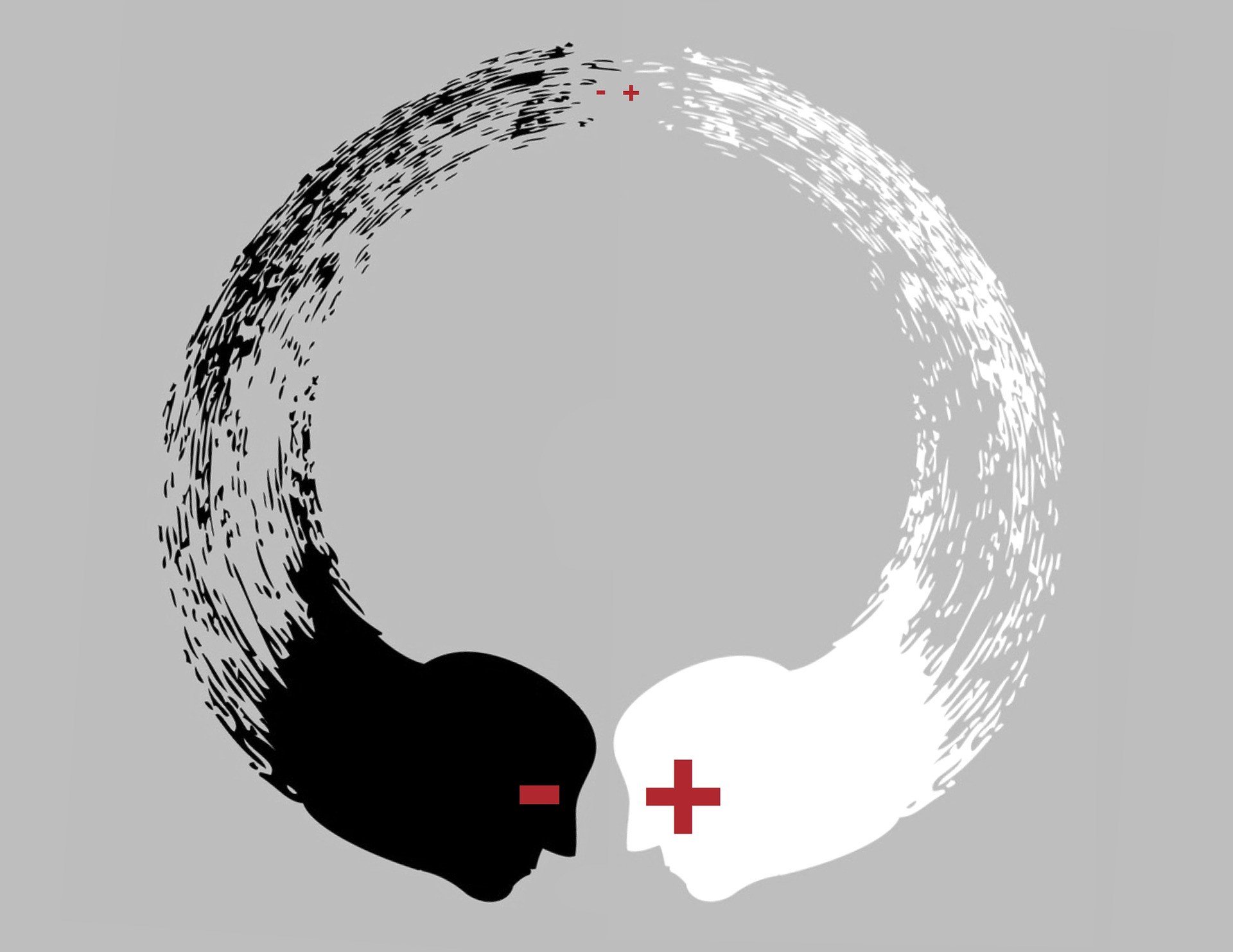
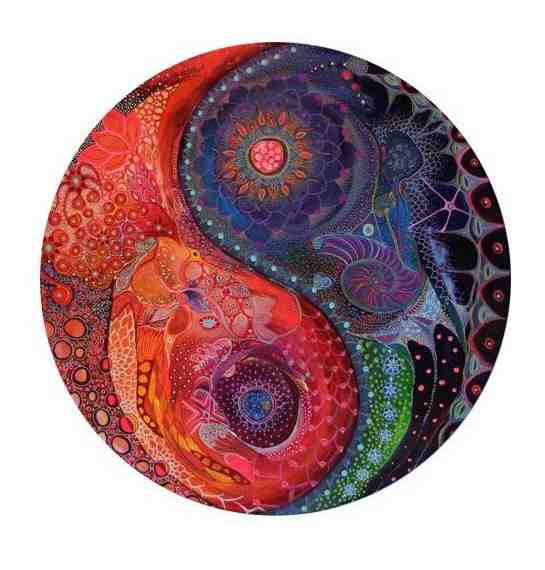
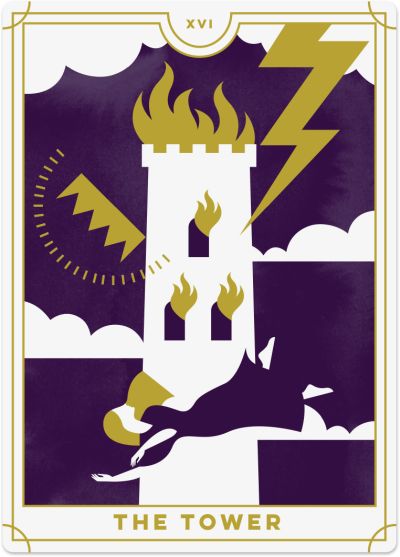

Finite And Infinite Games - Dazed, Confused & Ultimately Transcendent
The 3 Keys To Understanding Carse's Intent With "Finite And Infinite Games"
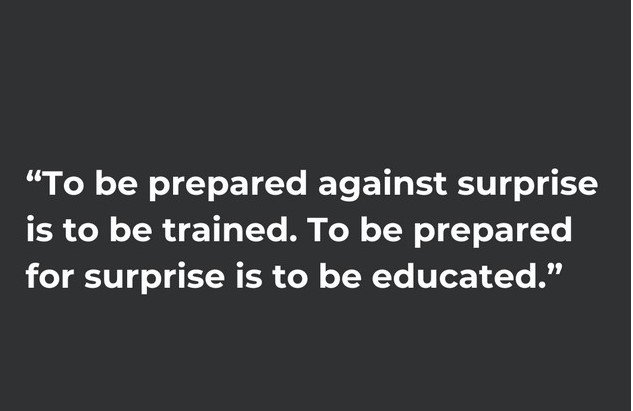
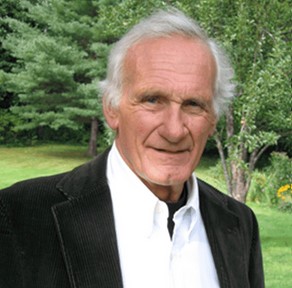
"I
am a classroom atheist. I advocate none of these ideas; or, perhaps, I
advocate them all equally. What students choose to do with them I want
them to do as freely as possible."
It is also well worth noting that Carse's style of writing in this book is very different to the games book.
In
"Breakfast At The Victory" he writes beautifully and movingly as he
interweaves deeply personal stories drawn from his own life with
insights shared in an interesting and compelling narrative style of
writing that is often quite poetic.
This contrast in presentation, together with his self identification as teacher, leads me to the second key.

[2] Language as Metaphor
In "Finite And Infinite Games" [section 72
p 102] Carse states that:
"At its root all language has the character of metaphor, because no matter what it intends to be about it remains language, and remains absolutely unlike whatever it is about.
That language is not about anything gives it its status as metaphor. Metaphor does not point at something there."
In his interviews and other writings Carse refers a number of times to the Tao Te Ching which opens with the words:
"The tao that can be told is not the eternal Tao.
The name that can be named is not the eternal name.
The unnamable is the eternally real."
The written style of the Tao Te Ching
can take your your breath away
with the poetry of its aphorisms and then leave you scratching your head
with the apparent irreconcilable contradictions they contain, which is a
similar experience to reading "Finite and Infinite Games"!
Quite
clearly, the purpose and meaning of the Tao Te Ching lies in the truth
to which it points, and in my view the same can be said of "Finite and
Infinite Games".
In Lost For Words? Experience Truth we noted that there is often a gap or disconnect between the meaning intended in words articulated and the meaning received:
"What I mean to say and what you hear may not be the same thing!"
We also noted that the
concepts we employ, the categorizations we apply, and the words we
choose and use to articulate a direct experience put us in a double
bind, and it is this:
"For all that we gain by being able to
speak about an experience we lose a greater amount of the
full meaning of that experience by speaking it."
Words are not the meaning they are the pointers to the meaning.
This begs the question:
"What is the meaning, or truth, to which Carse's words point?"
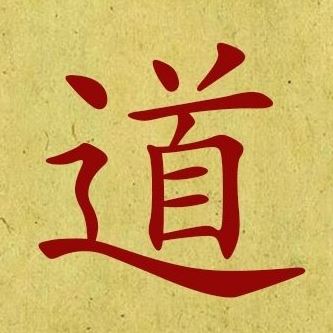
[3] Final Words
As I have been writing this article I have continued to read a great number of articles and reviews on this book, I have also now watched a number of videos and listened closely to several intervews with Carse shortly before he died, and I have also read and studied some of his other published material.
In my view nearly everyone misses his point, and especially Simon Sinek who has gained great traction with his theories about how to apply "Finite and Infinite Games" to the world of business.
Whilst I agree that we can change our mindset to a values based long game, and yes we can live antifragile, and we can generate considerable benefit to others and ourselves for doing so, but in doing this we are subverting the infinite game and turning it into just another finite game.
Adjusting, modifying and realigning our approach to life to accommodate infinite games is all "jolly good stuff" [as we Brits like to say] but we are metaphorically shuffling the deck chairs on The Titanic.
It is my view that Carse has a transcendent purpose.
This book is not an instruction manual, it is a wake up call.
It seems to me that a finite game takes place in the realm of the mind and is ruled by the ego, the infinite game takes place in the realm of the spirit and is consciousness expressed in human form.
To return to our opening analogy, The Teacher leans forward in his pulpit, he has almost finished.
He removes his glasses, pauses, and then for the last time he fixes his gaze upon all of us, his assembled readership, and closes his exhortation with these immortal words of truth:
"There is but one infinite game."
Further Reading:
How To Wake Up - 4 Simple Practices To Help You Wake Up Now
Return from the "Finite And Infinite Games " to: Walking The Talk
Or to: What Is Spirituality - Don't Throw The Out Baby With The Bathwater!
LATEST ARTICLES
The Battle For Your Mind - How To Win Inner Freedom In A Digital Age Of Distraction
 From External Events to Inner Events. We often think of “events” as things that happen out there: the traffic jam, the rude comment, the delayed email reply. But what truly shapes our experience is wh…
From External Events to Inner Events. We often think of “events” as things that happen out there: the traffic jam, the rude comment, the delayed email reply. But what truly shapes our experience is wh…How to See Your Thoughts Without Becoming the Story
 A Practical Guide to Thought-Awareness. You can spend your life inside the stories of your mind without ever learning how to see your thoughts clearly and objectively. Most of the stuff we tell oursel…
A Practical Guide to Thought-Awareness. You can spend your life inside the stories of your mind without ever learning how to see your thoughts clearly and objectively. Most of the stuff we tell oursel…The Collison Decision Matrix - A Simple Framework for Better Choices
 The Collison Decision Matrix Is A Practical Everyday Thinking Tool. Most of us spend a surprising amount of time worrying about decisions. From small ones such as what to wear, what to eat, what to te…
The Collison Decision Matrix Is A Practical Everyday Thinking Tool. Most of us spend a surprising amount of time worrying about decisions. From small ones such as what to wear, what to eat, what to te…The Power Of Asking The Right Question
 The Power Of Asking The Right Question Lies In The Quest For Insight. To experience the power of asking the right question you must develop the practice of asking questions. The best way to improve th…
The Power Of Asking The Right Question Lies In The Quest For Insight. To experience the power of asking the right question you must develop the practice of asking questions. The best way to improve th…Site Pathways
 Here is a site pathway to help new readers of Zen-Tools navigate the material on this site. Each pathway is based around one of the many key themes covered on this site and contain a 150 word introduc…
Here is a site pathway to help new readers of Zen-Tools navigate the material on this site. Each pathway is based around one of the many key themes covered on this site and contain a 150 word introduc…How To Live With Contradiction - Beyond Thought Let Stillness Speak
 A major impact on so many peoples' lives is the situational contradiction of unfilled realistic expectations. So where does all this leave us? Well here we are, with mental equipment that is more lim…
A major impact on so many peoples' lives is the situational contradiction of unfilled realistic expectations. So where does all this leave us? Well here we are, with mental equipment that is more lim…How To Trust The Process Of Mindfulness - Right Now
 In mindfulness, the process isn’t some distant goal — it's what is happening right now. When we talk about how to trust the process of mindfulness the credibility of the process is heavily dependent…
In mindfulness, the process isn’t some distant goal — it's what is happening right now. When we talk about how to trust the process of mindfulness the credibility of the process is heavily dependent…Inner Mastery For Outer Impact - Mental Clarity For Effective Action
 Insights only matter if they translate into consistent action. In a world crowded with quick fixes and motivational soundbites, the theme “Inner Mastery for Outer Impact” calls us to something more e…
Insights only matter if they translate into consistent action. In a world crowded with quick fixes and motivational soundbites, the theme “Inner Mastery for Outer Impact” calls us to something more e…The Wise Advocate - Helping You Achieve The Very Best Outcome
 The focus of your attention in critical moments of choice either builds or restricts your capacity for achieving the best outcome. When we talk of 'The Wise Advocate' its easy to think of the consigl…
The focus of your attention in critical moments of choice either builds or restricts your capacity for achieving the best outcome. When we talk of 'The Wise Advocate' its easy to think of the consigl…Trust The Process - Beyond The Cliche
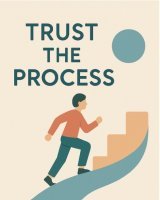 The phrase "trust the process" has become a cliche, the woo-woo mantra of the "self help" industry. Those three little words feel like they ought to mean something useful but hidden behind them are a…
The phrase "trust the process" has become a cliche, the woo-woo mantra of the "self help" industry. Those three little words feel like they ought to mean something useful but hidden behind them are a…The Dopamine Delusion - Why Anticipation Beats Achievement
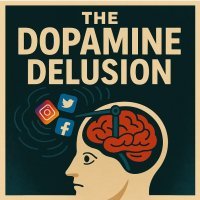 The thrill we feel is not in the having, but in the wanting. The more we have, the more we want. The more things we acquire and the easier things get for us, the more discontent we feel. The more spo…
The thrill we feel is not in the having, but in the wanting. The more we have, the more we want. The more things we acquire and the easier things get for us, the more discontent we feel. The more spo…The Power Of Silence Is Experienced In Your Use Of Language
 Practise the "Beneficial Neurological Delay" for optimal comprehension. The power of silence is experienced in your use of language, specifically: - How you formulate the words you use to think and in…
Practise the "Beneficial Neurological Delay" for optimal comprehension. The power of silence is experienced in your use of language, specifically: - How you formulate the words you use to think and in…
